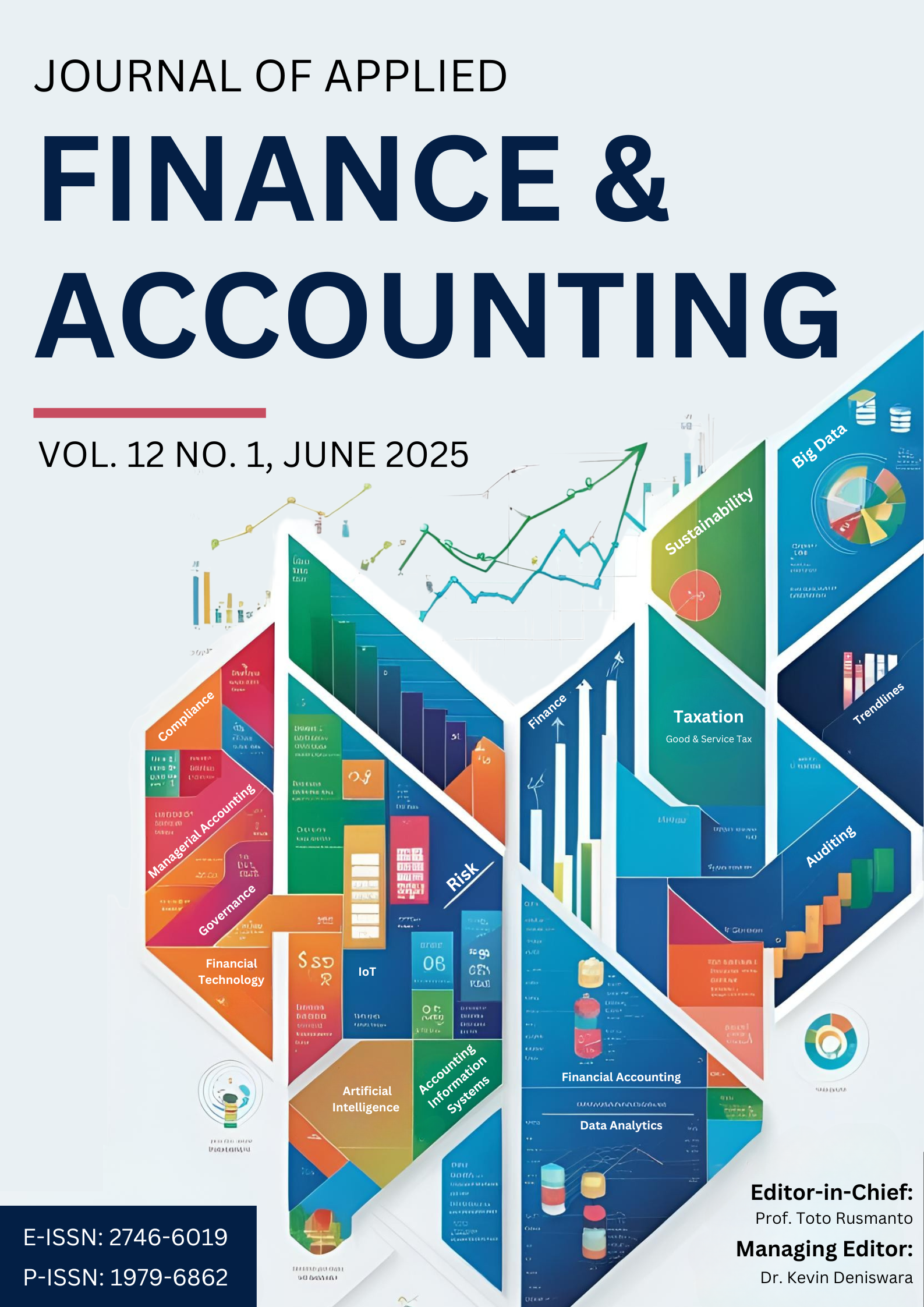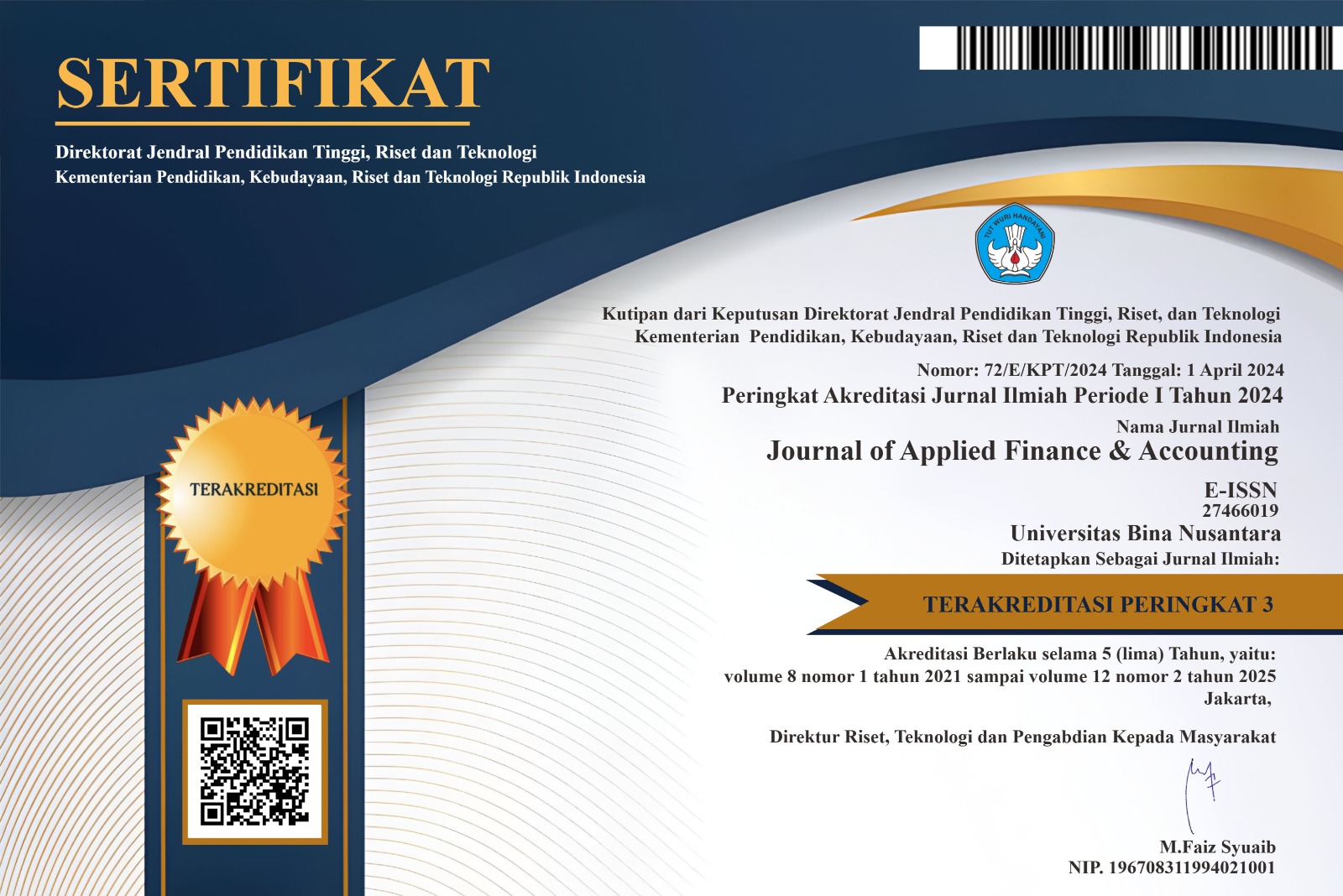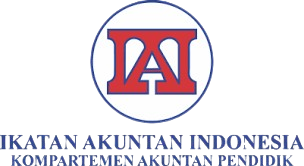CONTROLLING CORRUPTION TO STRENGTHEN THE ROLE OF THE EDUCATION BUDGET FUNCTION IN ACHIEVING SDG 4 IN INDONESIA
DOI:
https://doi.org/10.21512/jafa.v12i1.13443Keywords:
Education Function Budget, SDG 4, CCEI, Good GovernanceAbstract
Disparities in education budgets across regions, limited access to remote areas, and low participation rates at all educational levels represent significant challenges for Indonesia in achieving SDG 4 by 2030. This study investigates the contribution of education function expenditure to attaining SDG 4, with corruption control as a moderating variable. Utilizing 1,016 observations of secondary data from provincial, district, and city governments during 2021–2022, the findings reveal that education budgets substantially support SDG 4 achievement. However, overly procedural corruption control mechanisms diminish the effectiveness of budget utilization by restricting the flexibility in fund allocation. The scientific contribution of this research lies in providing empirical evidence on the moderating effect of corruption control on the effectiveness of education budgets in achieving SDG 4. From a practical standpoint, the study recommends the adoption of adaptive, risk-based corruption control mechanisms such as Risk-Based Internal Audit and performance-based fund disbursement systems to strike a balance between accountability and flexibility in budget management. This study is limited to district and city-level data over two years and focuses exclusively on the education function, thus, its findings may not fully represent conditions at the provincial level or other SDG sectors. Future research should broaden data coverage and incorporate qualitative methodologies to deepen understanding of bureaucratic processes and corruption control dynamics.
References
Alfarizi, M., & Sari, R. K. (2024). Alokasi Anggaran Pendidikan Menuju Visi SDGs di Indonesia: Wawasan Literatur Perbandingan Terhadap Negara ASEAN. Jurnal Budget: Isu dan Masalah Keuangan Negara, 9(1), 1-34.
Anisa Farras Azmii, Agnes Tika, Denaya Syabilla Fitri, dan Monika Septiyar. (2024). “Dampak Dan Upaya Memberantas Tindak Pidana Korupsi Di Lingkungan Perguruan Tinggi.” Aliansi: Jurnal Hukum, Pendidikan dan Sosial Humaniora 1(3):155–62.
Anugraheni, E. P., Setiawati, E., & Trisnawati, R. (2022). Analysis of Risk-Based Internal Audit Planning Implementation and Its Impact on Audit Quality: Case Study at the Inspectorate of Surakarta, Indonesia. Journal of Economics and Business, 5(3). https://doi.org/10.31014/aior.1992.05.03.448
Aini, A. N., Az-zahra, A. R. R., Yusuf, A. N., & Putri, E. A. (2024). Pengaruh Korupsi Dana Bos ( Bantuan Operasional Sekolah ) Terhadap Fasilitas Dan Kualitas Belajar Sekolah. : : Jurnal Cendekia Ilmiah, 4(1), 546–553.
Bahtiar, R. S., & Retnawati, H. (2021). Multivariate analysis on gross participation rate in primary school or equal by indicators of gender, residence and expenditure in indonesia year 2018, 2019 and 2020. International Journal for Educational and Vocational Studies, 3(4), 280.
E.Malelea, F., Chairil Furqan, A., . T., & . M. (2024). The Role of Government Internal Supervisory Apparatus (APIP) and Government Internal Control System (SPIP) in Achieving Sustainable Development Goals (SDGs) in Indonesia. KnE Social Sciences, 2024, 379–398.
Estes, R. J. (2010). Toward sustainable development: From theory to praxis. In Transnational social work practice (pp. 76–108). Columbia University Press.
Fajar, A. (2024). POLITIK HUKUM ANGGARAN NEGARA DI BIDANG PENDIDIKAN NASIONAL SEBAGAI PERWUJUDAN AMANAH UNDANG-UNDANG DASAR NEGARA REPUBLIK INDONESIA TAHUN 1945 (STUDI APBN TAHUN 2005-2011. Journal of Innovation Research and Knowledge (JIRK), 4(2), 1–23
Faradila, S., Saud, S., Andi, ;, & Furqan, C. (2024). The Effort to Realize Government Effectiveness through Implementation of Fully Accrual Accounting and Control Against Corruption. AKRUAL: Jurnal Akuntansi, 15(2), 2085–9643.
Furqan, A. C., & Din, M. (2019). Social perception on corruption and its influence on public legitimacy and open government (Indonesia). Espacios, 40(13).
G. Wibisana, A. (2014). the Elements of Sustainable Development: Principles of in-Tegration and Sustainable Utilization. Mimbar Hukum - Fakultas Hukum Universitas Gadjah Mada, 26(1), 102.
Guritno, D. C., & Mangkunegara, I. (2022). Korupsi dan SDGs: Perspektif Ekonomi Kelembagaan.
Inspektorat. (2020, November 25). Inspektur sulbar : Deteksi Lebih Dini Pelanggaran Maupun Kecurangan (fraud). Inspektorat Sulawesi Barat. https://inspektorat.sulbarprov.go.id/v2/inspektur-sulbar-mengikuti-sosialisasi- iepk/12142/general-news/inspektorat/50/
Ismail. (2020). The authority of the corruption eradication commission in the prosecution of corruption in Indonesia. Journal of Critical Reviews, 7(5), 177–182.
Kharisma, B. (2014). Good Governance Sebagai Suatu Konsep. Buletin studi ekonomi, 19(1), 11.
Munteanu, I., Ileanu, B. V., Florea, I. O., & Aivaz, K. A. (2024). Corruption perceptions in the
Lestari, B. B., Nugraheni, N., Husain, F., Semarang, U. N., Tinggi, S., & Pati, T. (2024). Penerapan Edukasi SDGS di Lingkungan Sekolah Guna Mendukung Terwujudnya Kesejahteraan Pendidikan. Jurnal Penelitian Ilmu-Ilmu Sosial, 1(10), 67–72.
Mendelski, M. (2021). 15 years of anti-corruption in Romania: augmentation, aberration and acceleration. European Politics and Society, 22(2), 237–258. https://doi.org/10.1080/23745118.2020.1729051
Naibaho, M. A., Nasution, N. U., Zuhro, R., Abdul, T., Harahap, W., & Ardhiansyah, Y. (2023). Evaluasi Program Anggaran Pendidikan pada Pengelolaan Mutu Pendidikan. Jurnal Ilmiah Multidisiplin, 1(4), 152–157.
Nguyen, M. L. T., & Bui, N. T. (2022). Government expenditure and economic growth: does the role of corruption control matter? Heliyon, 8(10), e10822.
Patilah Rizki Bintang, M. Rafli Firdaus, & Gunawan Santoso. (2022). Persfektif Implementasi Pasal 31 UUD 1945 dalam Sistem Pendidikan Negara Republik Indonesia. Jurnal Pendidikan Transformatif (Jupetra), 1(03), 195–199.
Pemerintah Indonesia. (2003). Undang-Undang Nomor 20 Tahun 2003 tentang Sistem Pendidikan Nasional. Jakarta: Pemerintah Indonesia.
Rahman, H. (2022). Reformasi Birokrasi: Korupsi Dalam Birokrasi Indonesia. Jurnal Ilmiah Administrasi Pemerintahan Daerah, 14(1), 135–161. https://doi.org/10.33701/jiapd.v14i1.2735
Ratnasari, D. H., & Nugraheni, N. (2024). Peningkatan Kualitas Pendidikan Di Indonesia Dalam Mewujudkan Program Sustainable Development Goals (Sdgs). Jurnal Citra Pendidikan, 4(2), 1652–1665.
Researchgate.Net, September, 131-151.https://www.researchgate.net/profile/DanurGuritno/publication/363920061_Korupsi_dan_SDGs_Perspektif_Ekonomi_Kelembagaan/links/6 33509ef76e39959d682c3e0/Korupsi-dan-SDGs-Perspektif-Ekonomi-Kelembagaan.pdf
Romdon, I. (2020). ELECTRONIC DISBURSEMENT INFORMATION SYSTEM (SiPECEL) AND MONITORING EVALUATION (e-MONEV) IN ORDER TO CREATE TRANSPARENCY OF PUBLIC SERVICES IN BLITAR REGENCY. 2507(February), 1–9.
Rukmana, Arianti ; Lestari, Ana ; Saman, S. ; H. J. (2019). MANAJEMEN PENGELOLAAN DANA BANTUAN OPERASIONAL SEKOLAH DALAM MENINGKATKAN MUTU PENDIDIKAN DI MADRASAH IBTIDAIYAH ARRAODA KOTA SORONG. Gradual.
Safira, N., & Wibowo, Y. H. (2021). Angka Partisipasi Kasar dan Angka Partisipasi Murni sebagai Indikator Keberhasilan Pendidikan Indonesia. PAKAR Pendidikan, 19(2), 101–115.
Sakinah, H., Chairil Furqan, A., & Meldawati, L. (2024). Achieving the Sdgs Through Strengthening the Capabilities of Apip and Corruption Control in Indonesia. 1(1), 185–195.
Salsadila, N., Efritadewi, A., & Widiyani, H. (2023). Pemberantasan Tindak Pidana Korupsi di Indonesia: Masalah dan Solusinya. Indonesian Journal of Law and Justice, 1(2), 9.
Saputra, N., & Nugroho, R. (2021). Good Governance Pada Pelayanan Publik: Sebuah Usulan Model Pengembangan Berbasis Perilaku. Jurnal MSDA (Manajemen Sumber Daya Aparatur), 9(1), 11– 26.
Sari, D. A., Margules, C., Lim, H. S., Sayer, J. A., Boedhihartono, A. K., Macgregor, C. J., Dale, A. P., & Poon, E. (2022). Performance Auditing to Assess the Implementation of the Sustainable Development Goals (SDGs) in Indonesia. Sustainability (Switzerland), 14(19).
Schengen Zone and their relation to education, economic performance, and governance. In PLoS ONE (Vol. 19, Nomor 7).
Setyaningsih, B. A. (2010). Evaluasi Anggaran Pendapatan Dan Belanja Daerah Kabupaten Boyolali.
Siagian, F. S., Lubis, A. H., Salwa, N. A., & Firouzfar, S. (2024). Kebijakan pemberantasan korupsi berbasis keadilan: Perbandingan antara Indonesia dan Denmark. Integritas: Jurnal Antikorupsi, 10(1), 29–52. https://jurnal.kpk.go.id/index.php/integritas/article/view/1134/253
Thi Hoa, T. (2020). The effects of corruption on the human capital accumulation process: Evidence from Vietnam. Economics of Transition and Institutional Change, 28(1), 69–88.
Tuakara, Y. (2025). Dampak Kebijakan Dana Otonomi Khusus terhadap Peningkatan Sarana dan Prasarana Pendidikan di Merauke. Journal of Artificial Intelligence and Digital Business (RIGGS), 4(1), 67–73.
UNICEF Indonesia. (n.d.). Pendidikan dan Remaja. Diakses dari https://www.unicef.org/indonesia/id/pendidikan-dan-remaja.
Unterhalter, E. (2019). The Many Meanings of Quality Education: Politics of Targets and Indicators in SDG4. Global Policy, 10(January), 39–51.
Wahyudin, D. (2019). Isu-Isu Tentang Efisiensi Tata Kelola Organisasi Dan Anggaran Pendidikan. Foramadiahi: Jurnal Kajian Pendidikan dan Keislaman, 10(1), 110.
Downloads
Published
Issue
Section
License
Authors who publish with this journal agree to the following terms:
Authors retain copyright and grant the journal right of first publication with the work simultaneously licensed under a Creative Commons Attribution License that allows others to share the work with an acknowledgement of the work's authorship and initial publication in this journal.
Authors are able to enter into separate, additional contractual arrangements for the non-exclusive distribution of the journal's published version of the work (e.g., post it to an institutional repository or publish it in a book), with an acknowledgement of its initial publication in this journal.
Authors are permitted and encouraged to post their work online (e.g., in institutional repositories or on their website) prior to and during the submission process, as it can lead to productive exchanges, as well as earlier and greater citation of published work (See The Effect of Open Access).





